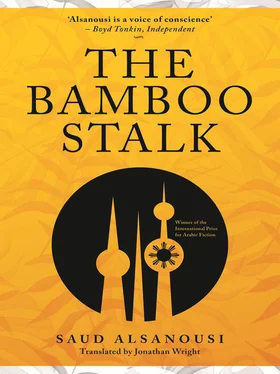For the first time, I was confident of what I was saying. God couldn’t be promoted in this way because, as I had started to feel, God is greater, God is mightier and much deeper than that. I didn’t say much because Ibrahim looked upset and I didn’t want to sleep in the street. I pointed to my heart and said, ‘Faith lies here, but with this missionary activity of yours, you’re trying to put it here.’ I pointed to my head. ‘But faith doesn’t stay there long.’
‘What do you mean?’ he asked, a sceptical look in his eyes.
‘The only place for faith is in your heart,’ I said with unusual confidence.
He looked at me in silence and I continued: ‘Look at yourself in the mirror and you’ll find enough miracles there to dispel your doubts, because you’re a miracle in yourself.’
I pointed to the drawer next to his bed. ‘Get the Qur’an out and translate some of it for me instead of offering feeble proofs that weaken your case.’
Religions are bigger than their adherents. That’s what I’ve concluded. Devotion to tangible things no longer matters as far as I’m concerned. I don’t want to be like my mother, who can only pray to a cross, as if God lived in it. I don’t want to be like one of the Ifugao and never take a step unless it’s sanctioned by the anito statues, which help my work prosper, protect my crops and save me from the evil spirits at night. I don’t want to be like Inang Choleng, tying my relationship with God to a favourite statue of the Buddha. I don’t want to seek baraka from a statue of a white horse with wings and the head of a woman, as some Muslims do in the south of the Philippines. I remember that statue well, when I once asked a Muslim boy at school if he had a statue or an icon of the Prophet Muhammad. He came back the next day and told me that drawing pictures or making statues of the Prophet was forbidden in Islam. But then he put his hand in his satchel and took out this statue. I was amazed at the way it looked and when I asked him what it was, he said, ‘It’s Buraq.’ I forgot about Buraq until I saw it again later in various sizes, some as large as a small foal, in the National Museum of the Philippines. On a rectangular plaque on the glass case it said, Buraq: the animal that the Prophet of Islam rode on his Night Journey from Mecca to Jerusalem and to Heaven .
The statue of Buraq, the cross, the Buddha, the anito, imaginary miracles and other such things help to reinforce people’s faith. People aren’t satisfied with the miracles that took place in distant times and that were the monopoly of prophets when religions were in their infancy. So everyone who wants to find faith goes looking for miracles that don’t exist. They make them up and believe in them, but their belief only shows how much doubt they still have.
I was sitting in front of Ibrahim. He was silent, as was I. In my right ear I heard the call to prayer, in my left ear the ringing of church bells. The smell of incense from the Buddhist temples hit my nostrils. I ignored the sounds and the smell. I focused on my steady heartbeat and I knew that God was there.
3
With Ibrahim’s help I found a flat that suited me on the third floor of an old building in Jabriya, an area I hated, about a ten-minute walk from where Ibrahim lived. The building had no families at all because the usual practice in Kuwait is that families live in special buildings where unmarried young men are not allowed to live. Where I lived there were no women or children at all. It was like a prison or a military camp. Migrants of various nationalities lived in the flats and some of them housed more than ten people. Most of the flats in the buildings were empty during the week but were noticeably full of young men on Thursday and Friday nights and on religious and official holidays. Only then would I hear women’s voices in the building. On the third floor, where my flat was, there were three other flats. One of them had five young Filipinos, in another there was an Arab man more than fifty years old, and the third was rented by a group of young men who came only at weekends, when they would make a lot of noise after midnight with laughing, singing and rowdy activity.
Renting the flat was a luxury I hadn’t dreamt of. I had two bedrooms, a sitting room, a bathroom and a kitchen all to myself. Moving was easy because the only things I had that needed moving would fit in three bags — a large one for my clothes, a small one for the laptop and, most important of all, the briefcase where I kept my documents. Ibrahim lent me a mattress and a duvet and brought them over in his car. Khawla was constantly in touch, tracking my move. ‘I feel guilty. I was one of the reasons why you left our house,’ she said. She said that Grandmother missed me. Her knees must be in a bad way , I thought. Hind didn’t call but she sent me a text message asking for my new address. I sent her the address and a few hours later a pick-up truck arrived with my bed, my fridge, the wardrobe, the television and a small cardboard box. The workers brought the things up, then left. I opened the cardboard box and there was my tortoise, hiding in her shell. There was a crack in the top of the shell that I hadn’t noticed before. I remembered kicking her a few days earlier in an angry outburst and I felt bitter remorse. I found a small piece of paper inside the cardboard box. In beautiful handwriting, Khawla had written: Aziza was jealous of your tortoise and denounced her to Grandmother, who got angry and evicted her,P . A cruel joke but I laughed, in the knowledge that Khawla wanted to make me laugh.
Late that evening, after I had arranged the flat, my mobile rang. I thought it would be Ibrahim but in fact it was from Hind, asking me about him.
‘What’s that young man like, the one that Khawla told me about?’ she asked. What does he look like? How old is he? Where does he live? Does he belong to some organisation? Lots of questions, rather like an interrogation. I answered them to the best of my knowledge, and when I had done so, she gave me a warning. ‘Isa,’ she said, ‘beware of those backward people.’ I was tongue-tied. ‘In Kuwait,’ she continued, ‘there are many types of people who are better to make friends with than those people you’re about to get involved with. I’m here if you need anything, but keep your distance from these dubious characters.’
* * *
Isolation is like a little corner where you’re alone with your mind and you can’t avoid looking it in the face. My mind would probably have wasted away like an unused muscle if I hadn’t pushed it to the limits when I was alone. I hadn’t planned to use it because I didn’t trust it and it made me sceptical about everything. Perhaps my mind acted of its own accord. It felt neglected and sprang into action. How is it that ideas have this ability to distract us from everything else? Hours went by without me noticing that my stomach was empty or that I needed to sleep. Maybe my head was so stuffed that I lost my appetite, or perhaps my mind was so distracted all the time that I might as well have been asleep. I would look out of the window at the street and say, ‘I haven’t been outside for three days.’ I suddenly realised I had been in the flat all that time. Without feeling it, it was as if I were in mourning. It was a mourning without flags at half mast, without the people outside wearing the sad faces I saw on the day I arrived in Kuwait. How did I spend all my time? I’m trying to remember. I didn’t watch television. I didn’t read a word. I never called anyone. Apart from thinking, what was I doing?
For the first time in my life, I felt useless. My old dream had come true, I had the paradise I was promised, I had travelled to Kuwait and I had more money than I needed. What next? In the Philippines all I had was my family. In Kuwait I had everything except a family.
Читать дальше












